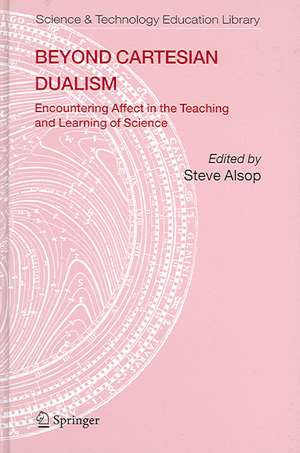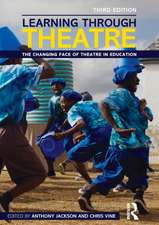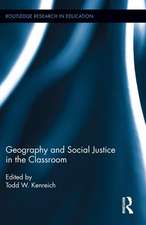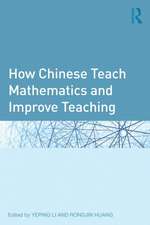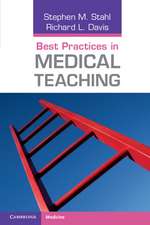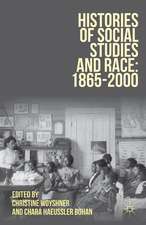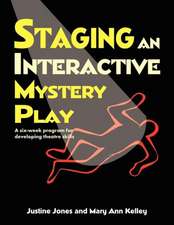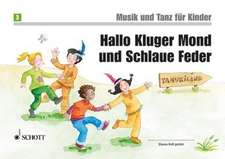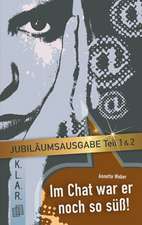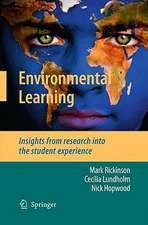Beyond Cartesian Dualism: Encountering Affect in the Teaching and Learning of Science.: Contemporary Trends and Issues in Science Education, cartea 29
Editat de Steve Alsopen Limba Engleză Hardback – 17 noi 2005
This book will be an invaluable resource for anybody interested in science education research and more generally in research on teaching, learning and affect. It offers educators and researchers a challenge, to recognize the mutually constitutive nature of cognition and affect.
Din seria Contemporary Trends and Issues in Science Education
- 20%
 Preț: 568.91 lei
Preț: 568.91 lei - 20%
 Preț: 814.76 lei
Preț: 814.76 lei - 18%
 Preț: 951.77 lei
Preț: 951.77 lei - 15%
 Preț: 638.43 lei
Preț: 638.43 lei - 15%
 Preț: 636.80 lei
Preț: 636.80 lei - 15%
 Preț: 628.08 lei
Preț: 628.08 lei - 15%
 Preț: 637.46 lei
Preț: 637.46 lei - 18%
 Preț: 951.29 lei
Preț: 951.29 lei - 15%
 Preț: 644.95 lei
Preț: 644.95 lei - 18%
 Preț: 951.91 lei
Preț: 951.91 lei - 18%
 Preț: 1218.66 lei
Preț: 1218.66 lei - 18%
 Preț: 953.65 lei
Preț: 953.65 lei - 15%
 Preț: 641.71 lei
Preț: 641.71 lei - 15%
 Preț: 697.15 lei
Preț: 697.15 lei - 15%
 Preț: 644.18 lei
Preț: 644.18 lei - 15%
 Preț: 640.55 lei
Preț: 640.55 lei - 15%
 Preț: 640.06 lei
Preț: 640.06 lei - 15%
 Preț: 639.08 lei
Preț: 639.08 lei - 18%
 Preț: 1388.68 lei
Preț: 1388.68 lei -
 Preț: 389.31 lei
Preț: 389.31 lei - 15%
 Preț: 465.66 lei
Preț: 465.66 lei - 18%
 Preț: 1832.08 lei
Preț: 1832.08 lei -
 Preț: 398.15 lei
Preț: 398.15 lei - 15%
 Preț: 644.18 lei
Preț: 644.18 lei - 18%
 Preț: 945.47 lei
Preț: 945.47 lei - 15%
 Preț: 644.30 lei
Preț: 644.30 lei - 18%
 Preț: 1215.04 lei
Preț: 1215.04 lei
Preț: 641.85 lei
Preț vechi: 755.13 lei
-15% Nou
Puncte Express: 963
Preț estimativ în valută:
122.81€ • 128.58$ • 101.62£
122.81€ • 128.58$ • 101.62£
Carte tipărită la comandă
Livrare economică 05-19 aprilie
Preluare comenzi: 021 569.72.76
Specificații
ISBN-13: 9781402038075
ISBN-10: 1402038070
Pagini: 198
Ilustrații: XVI, 198 p.
Dimensiuni: 155 x 235 x 15 mm
Greutate: 0.46 kg
Ediția:2005
Editura: SPRINGER NETHERLANDS
Colecția Springer
Seria Contemporary Trends and Issues in Science Education
Locul publicării:Dordrecht, Netherlands
ISBN-10: 1402038070
Pagini: 198
Ilustrații: XVI, 198 p.
Dimensiuni: 155 x 235 x 15 mm
Greutate: 0.46 kg
Ediția:2005
Editura: SPRINGER NETHERLANDS
Colecția Springer
Seria Contemporary Trends and Issues in Science Education
Locul publicării:Dordrecht, Netherlands
Public țintă
ResearchCuprins
Bridging the Cartesian Divide: Science Education and Affect.- The Importance of Affect in Science Education.- Incalculable Precision: Psychoanalysis and the Measure of Emotion.- Attitudes Toward Science: A Review of the Field.- Empowered for Action? How Do Young People Relate to Environmental Challenges?.- The Shifting Roles of Acceptance and Dispositions in Understanding Biological Evolution.- Student Learning in Science Classrooms: What Role Does Motivation Play?.- Practical Work and the Affective Domain: What Do We Know, What Should We Ask, and What is Worth Exploring Further?.- Museums, Affect, and Cognition: The View from Another Window.- Emotions and Science Teaching: Present Research and Future Agendas.- Active Science for Child Refugees.- Orchestrating the Confluence: A Discussion of Science, Passion, and Poetry.- From Despair to Success: A Case Study of Support and Transformation in an Elementary Science Practicum.- Emotional Development, Science and Co-Education.
Textul de pe ultima copertă
There is surprisingly little known about affect in science education. Despite periodic forays into monitoring students’ attitudes-toward-science, the effect of affect is too often overlooked. Beyond Cartesian Dualism gathers together contemporary theorizing in this axiomatic area. In fourteen chapters, senior scholars of international standing use their knowledge of the literature and empirical data to model the relationship between cognition and affect in science education. Their revealing discussions are grounded in a broad range of educational contexts including school classrooms, universities, science centres, travelling exhibits and refugee camps, and explore an array of far reaching questions. What is known about science teachers’ and students’ emotions? How do emotions mediate and moderate instruction? How might science education promote psychological
resilience? How might educators engage affect as a way of challenging existing inequalities and practices?
This book will be an invaluable resource for anybody interested in science education research and more generally in research on teaching, learning and affect. It offers educators and researchers a challenge, to recognize the mutually constitutive nature of cognition and affect.
resilience? How might educators engage affect as a way of challenging existing inequalities and practices?
This book will be an invaluable resource for anybody interested in science education research and more generally in research on teaching, learning and affect. It offers educators and researchers a challenge, to recognize the mutually constitutive nature of cognition and affect.
